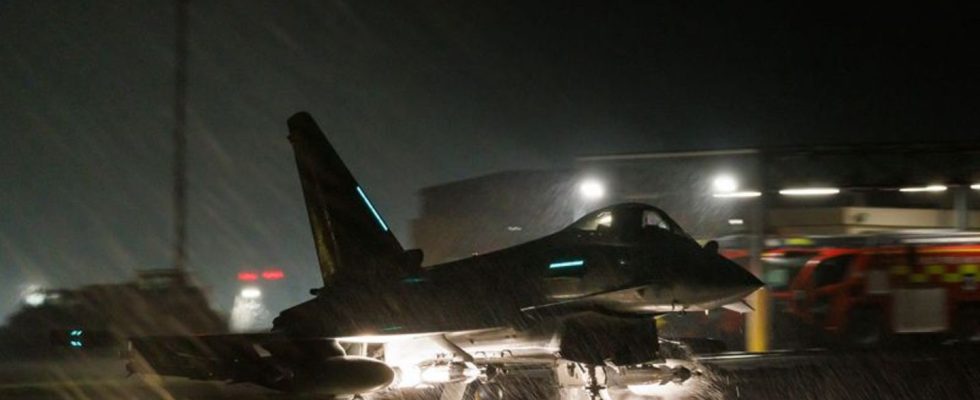War in the Middle East
Israel reportedly proposes ceasefire
The USA and Great Britain have attacked Houthi militia positions in Yemen – it is the second coordinated military strike in two weeks. photo
© As1 Jake Green Raf/Royal Air Force/dpa
The USA is once again attacking the Houthi militia in Yemen, Israel is expanding the fighting in the south of Gaza – the situation in the Middle East is extremely dangerous. Will efforts for peace succeed? The overview.
While Israel’s army continues its offensive in the south As the Gaza Strip expands, diplomatic efforts to end the fighting are in full swing. According to a media report, Israel’s government, which is under pressure and headed by Prime Minister Benjamin Netanyahu, has now proposed a two-month ceasefire in order to free the hostages still being held by the Islamist Hamas. Meanwhile, Arab countries are said to be working on a peace proposal under which Saudi Arabia would offer recognition of Israel in return for the creation of a Palestinian state.
Another military strike against the Houthi militia
Meanwhile, the USA and Great Britain, with the support of other allies, have again attacked Houthi militia positions in Yemen. In the coordinated military strike, eight locations of the Islamists supported by Iran were attacked, the allies said in a statement released by the Pentagon. The EU states also want to participate militarily in securing international shipping in the Red Sea, which is threatened by new Houthi attacks. They reached an agreement in principle on a military operation that, according to diplomats, should ideally start next month.
Fierce fighting in southern Gaza
The Houthi militia wants to force an end to the Israeli attacks in Gaza by shelling ships. Eyewitnesses reported violent clashes between Israeli soldiers and Hamas fighters in the west of Khan Yunis. The city, located in the south of the sealed-off coastal strip, is considered a Hamas stronghold. The fighting took place in the immediate vicinity of two hospitals and at tent cities for refugees from northern Gaza, it said. The Palestinian Red Crescent relief organization spoke of dozens of deaths and injuries.
According to Israeli media reports, the military confirmed that it had made a major advance into an area in the west of Khan Yunis that it had not previously entered. The operation could take several days. The aim is to render Khan Yunis’s Hamas brigade incapable of fighting. So far, 50 Hamas fighters have been killed. The army said three soldiers were killed on the Israeli side. The war was triggered by the worst massacre in Israel’s history, which terrorists from Hamas and other extremist groups carried out in southern Israel on October 7th.
Report: Israel’s offer does not include an end to the war
On the Israeli side, 1,200 people were killed, most of them civilians. Israel responded with massive air strikes and a ground offensive. According to the Hamas-controlled health authority, more than 25,200 people have been killed so far. This number, which does not distinguish between fighters and civilians, is difficult to independently verify.
Israel has now submitted an offer for a two-month ceasefire to mediators from Egypt and Qatar, the news portal “Axios” reported in the evening, citing two Israeli officials. According to the report, the offer does not involve Israel ending the war – instead, the military would simply withdraw from population centers. The Palestinians who fled to the south of the Gaza Strip on the orders of the Israeli military would be able to return to the north. It would be Israel’s most far-reaching offer of its kind to date.
During a week-long ceasefire at the end of November, Hamas released 105 hostages. In return, Israel released 240 Palestinian prisoners from prisons. Since then, Israel’s government has shown little willingness to make concessions for further hostage releases. According to the Israeli government, the terrorists are currently holding 136 people, 25 of whom are probably no longer alive. With the death of each hostage, criticism of Prime Minister Netanyahu grows.
Arab states are working on a peace plan
Hamas had previously linked any new hostage releases to an end to the war. To achieve this, according to the Wall Street Journal, Arab countries are working on a proposal whereby Saudi Arabia would offer recognition of Israel in return for the creation of a Palestinian state. The details are still being worked out, but so far Israel’s attitude is negative. Only at the weekend did Netanyahu make it clear that he was still against a two-state solution after the end of the Gaza war.
EU criticizes Netanyahu
The Israeli head of government received criticism for this attitude at a meeting of European foreign policy experts in Brussels. In addition to the USA, Germany and the EU are also increasing the pressure on opponents of a two-state solution. “All those who don’t want to know anything about it have not yet come up with any other alternative,” criticized Federal Foreign Minister Annalena Baerbock at the meeting with her EU colleagues. Not only Israel, but also the Islamist Hamas rejects a two-state solution, according to which an independent, democratic and demilitarized Palestinian state should exist peacefully alongside Israel. Hamas instead seeks to destroy the state of Israel.
US imposes sanctions on Hamas supporters
The US government has meanwhile imposed further sanctions against financial supporters of Hamas. The State Department and the Treasury Department in Washington said the punitive measures targeted several people and entities that had arranged money transfers in the Gaza Strip, including from Iran to Hamas. This also involves transactions using cryptocurrencies from the Revolutionary Guards, the elite unit of the Iranian armed forces, to Hamas.
What is important today
Aid organizations want to speak out in Geneva about the continued catastrophic humanitarian situation in the Gaza Strip. The UN Security Council wants to meet for a meeting in the evening. Meanwhile, tensions in the Red Sea continue after the renewed military strike by the USA and allies against the Houthi militia.

